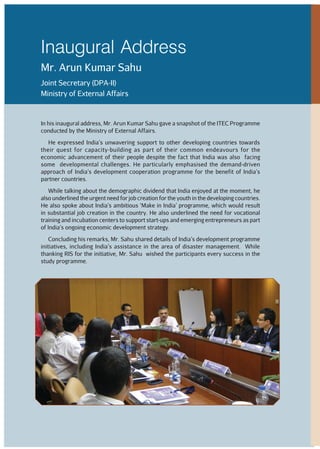This document provides information about a capacity-building program on learning and South-South cooperation conducted in 2015 by the Research and Information System for Developing Countries (RIS) in New Delhi, India. The program was attended by 28 delegates from 19 countries and covered six thematic areas related to South-South cooperation, including science, technology and innovation, trade and investment, financial architecture, peace and security, the role of civil society, and theoretical frameworks. The document lists the RIS faculty and consultants who led sessions on topics such as intellectual property rights, biosafety, regional integration, development cooperation in Latin America, and the Sustainable Development Goals. It provides a high-level overview of the two-week program.















